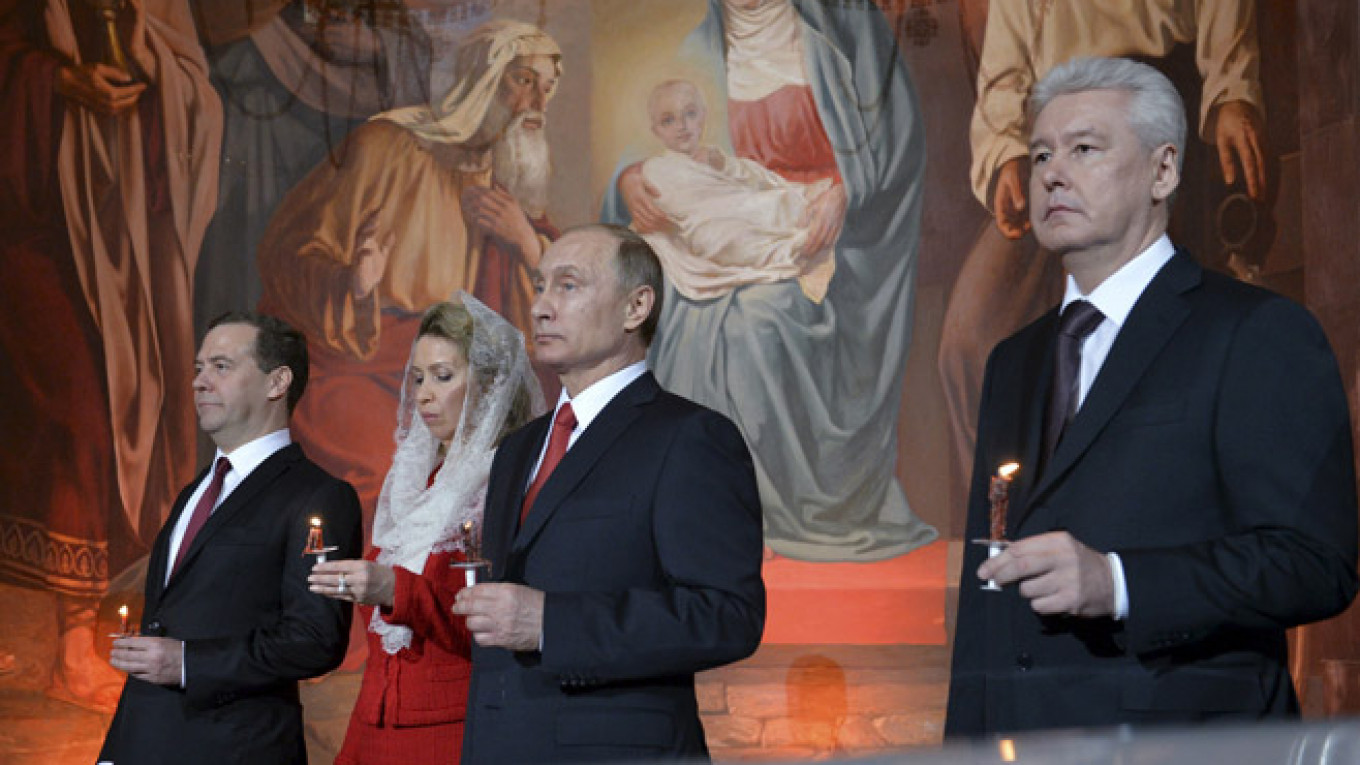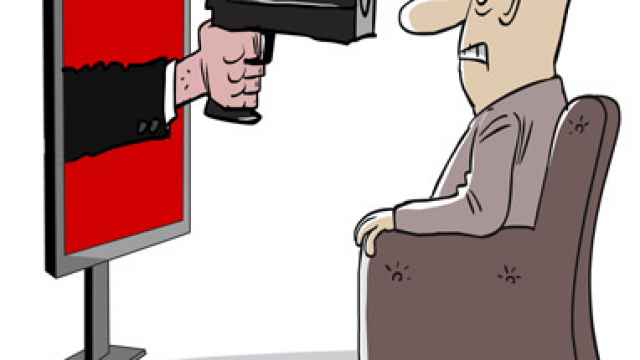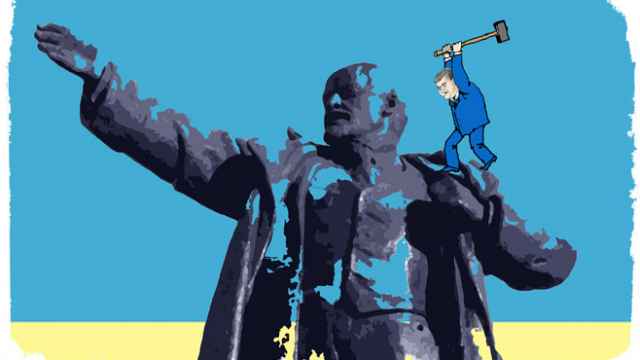Many recent social and political scandals in Russia have been connected in one way or another with charges of "insulting" the feelings or beliefs of the country's self-appointed guardians of morality.
The authorities close down a production of Wagner's opera "Tannhauser" at the Novosibirsk Opera and Ballet Theater for its "offensive" depiction of Jesus Christ, prohibit movie theaters from showing the Hollywood film "Child 44" because it "offends" war veterans, or press criminal charges for allegedly lewd dancing against the backdrop of the Malaya Zemlya memorial in Novorossiisk. Apparently, nobody is offended by the mountains of garbage lying near that very same memorial.
And finally, the federal authorities have filed criminal charges against a dance studio whose underage students were seen on a video "twerking" while wearing leotards in the colors of St. George's ribbon.
Thank God, President Vladimir Putin did not touch on moral and ethical issues during his recent live call-in show with the Russian people. There was no mention of twerking, "Tannhauser,'' banned films or the recent bill to criminalize abortion that the State Duma has shown no qualms about adopting.
That's good news. Otherwise, if the national leader had so much as hinted that the country was in "spiritual straits," some overzealous vigilantes might have gone to God knows what lengths to correct supposed "excesses" on their own. There would be no limit to their self-righteously medieval indignation.
Thus, without any direct instructions from the president, "concerned" members of society continue discovering just how far they can go in "putting things right in Russia." Meanwhile, everyone is waiting to see how low they can go in their obscurantist witch hunt before hitting bottom.
Without any coherent ideology to guide them, these "concerned" citizens grope about in the dark like people lost in the woods at night. A guiding ideology would make it easier to predict what is acceptable and what is not.
But when asked why something is unacceptable today that only yesterday was perfectly fine, Russia's modern-day inquisitors — who are cobbling together a system of taboos where only yesterday there was an ideological vacuum — can only answer, "Just because, that's why."
The moment someone posted that video of the young ladies twerking to the Internet, it set off a chain reaction. The owner of the premises refused to continue renting to the dance studio and the authorities are now prepared to check practically every adolescent dance group in the country for improper behavior.
If nobody had posted that video, the public would never have expressed indignation over such "debauchery." There are no criteria, no benchmarks for right and wrong. It is anybody's guess as to what is decent, or to the contrary, depraved and unpatriotic.
If it were not for the upcoming 70th anniversary of Victory Day, the authorities might never have taken notice of the movie "Child 44." Unfortunately, the attempts to define and force others to follow principles of "proper morality" stem not from sincere faith in certain ideals — most often in the form of prohibitions — but from cynical politicking, from the desire to jump on the political bandwagon.
Thus, for the mayor of Berdsk, a town in the Novosibirsk region, to speak out against direct elections as a tool of Western intelligence services, makes him not an idiot, but a politically adept leader. After such a speech, anyone who fires him becomes a pawn of the U.S. State Department.
Ironically, the very people whose personal and professional lives are hardly exemplary are the most active in formulating the current political trends, making all this hypocrisy all the more vulgar and disgusting. Perhaps certain individuals such as ultraconservative lawmakers Yelena Mizulina and Vitaly Milonov are sincere in preaching intolerance, but they are the minority among Russia's ruling elite.
The rest are ready to swear whatever oath necessary, depending on how the political winds are blowing at any given moment. That is why attempts to keep with the latest political and ideological trend often come off as ridiculous and absurd.
Thus, Presidential Envoy to the Siberian Federal District Nikolai Rogozhkin made a laughing stock of himself when he blamed fires in the region on the machinations of some vague "opposition" forces.
In contrast to the Soviet era, the aimless search for new standards of morality has not been entrusted to such powerful structures as the Communist Party, the Young Communist League, the Pioneers or the ideological department of the CPSU Central Committee.
Those agencies regularly issued answers to the pressing questions of the time: Who is a friend and who is a foe, what defines a dissident, which ensembles can perform and which cannot, which films can appear in movie theaters and which are best banned. They even made rulings on whether it was patriotic to wear jeans or long hair. They set clear, simple and narrow limits for acceptable behaviors and ideas.
In modern Russia, it all boils down to individual, and at times outlandish initiatives by politicians suddenly seized by the crusading spirit, or else "projects" imposed by senior officials that, upon closer inspection, turn out to be nothing more than cynical, shameless and, yes, immoral attempts to pocket budgetary funds.
Russian society has a natural desire for a set of moral and ethical guidelines that the majority can understand, support and follow. Meanwhile, the fatigue from political cynicism and lies is accumulating. And although that dissatisfaction is far from erupting into public outrage, it causes the people to grow increasingly alienated from and distrustful of political institutions.
The new ideological guidelines emerge to a large extent from state-controlled media, but also independently of them — as the result of objective factors in a society in which the primary rule is: "Every man for himself, and against every other." For now, the Russian masses have not responded to calls by the "champions" of ultraconservative ideologies to establish an almost medieval, totalitarian society.
And, against the ever-present informational white noise in Russia's public discourse, they remain equally indifferent to calls for banning this or that new outrage based on charges of "immorality."
Georgy Bovt is a political analyst.
A Message from The Moscow Times:
Dear readers,
We are facing unprecedented challenges. Russia's Prosecutor General's Office has designated The Moscow Times as an "undesirable" organization, criminalizing our work and putting our staff at risk of prosecution. This follows our earlier unjust labeling as a "foreign agent."
These actions are direct attempts to silence independent journalism in Russia. The authorities claim our work "discredits the decisions of the Russian leadership." We see things differently: we strive to provide accurate, unbiased reporting on Russia.
We, the journalists of The Moscow Times, refuse to be silenced. But to continue our work, we need your help.
Your support, no matter how small, makes a world of difference. If you can, please support us monthly starting from just $2. It's quick to set up, and every contribution makes a significant impact.
By supporting The Moscow Times, you're defending open, independent journalism in the face of repression. Thank you for standing with us.
Remind me later.







